100 Film Favorites – #18: Inglourious Basterds
(Quentin Tarantino, 2009)
“This just might be my masterpiece.”
We’re now getting into movies where it’s almost hard for me to say anything about each selection beyond “OMG guys this movie is great.” I’ll keep trying, but I make no promises past #15.
Inglourious Basterds is a war movie in the tradition of the “Macaroni Combat” subgenre (the war film counterpart of Spaghetti Westerns – combat movies made in Spain and Italy, and tinged with exploitation elements such as over-the-top violence). In fact, one of the more notable Macaroni Combat films is the original (and correctly spelled) Inglorious Bastards, released in 1978.
Tarantino’s film, set primarily in Nazi-occupied France in 1944, follows three groups as they concoct plans to eliminate the leadership of the Nazi Party at a gala movie premiere. Let me say now that this is a movie which deserves to be seen rather than spoiled, so I would suggest watching it before you proceed reading.
Like Pulp Fiction, the film is split into multiple “chapters,” complete with title cards for each. In the first, set in 1941, Colonel Hans Landa of the SS investigates the home of a French dairy farmer. Landa, nicknamed the “Jew Hunter,” is notoriously skilled at his job. He manages to wheedle out of the farmer the location of the Dreyfuses, a Jewish family hiding beneath the floorboards, and slaughters every Dreyfus save for teenage daughter Shoshana, who manages to escape.
Chapter 2 introduces the titular “Basterds,” a group of scrappy Jewish-American troops (and one rogue German) led by Lt. Aldo Raine (Brad Pitt). The Basterds travel around behind enemy lines, committing acts of sabotage and brutal violence to impede the Nazi war effort. By 1944, word of the Basterds’ exploits has traveled throughout the German army, resulting in widespread fear of the team’s various members. One Basterd in particular has the Nazis running scared – Donny Donowitz, “The Bear Jew,” whom many German soldiers believe to be a golem (a vengeful homunculus from Jewish folklore). The Basterds’ standard M.O. involves ambushing a German unit, then killing and scalping nearly every soldier in that unit. Only a small handful of Nazis are left alive and offered a choice: whether or not to betray the location and size of fellow Nazi units nearby. Should they refuse, Donowitz brandishes a baseball bat and “beats [their] ass to death with it.” Should they comply, the Basterds free them (it’s vital that someone spread the tale, you see)…but not before carving into each survivor’s head a swastika – a “uniform he can’t take off.”
Chapter 3 reveals that Shoshana Dreyfus, now three years older and living under the alias of Emmanuelle Mimeux, works as the proprietress of a small cinema. One day, she is approached by a young German soldier who gradually reveals himself to be Frederick Zoller, a sniper who recently killed hundreds of enemy troops singlehandedly while under siege in a bell-tower. Zoller is hailed throughout Nazi Germany as a war hero, and propaganda minister Josef Goebbels commissions a film to be made about the event, in hopes of bolstering the German fighting spirit. In one of many showy gestures intended to win “Mimieux’s” affections, Zoller campaigns to have the film premiere, a high profile event which will doubtlessly host several top Nazi officials, at Shosana’s theater. She is reluctant at first, but then concocts a plan with her black projectionist and lover to burn down the cinema on “Nazi Night.”
Meanwhile, the British military have learned of the upcoming premiere (but not Shoshana’s plot) and devise their own plan to assassinate the high-ranking Nazis at the event, in a mission known as “Operation Kino” (“Kino” is German for cinema/movie theater). Lt. Archie Hicox (Michael Fassbender), a British officer who also happens to be a renowned critic of German film, is charged by Winston Churchill himself to lead the mission. Operation Kino involves rendezvousing with the German-speaking members of the Basterds in a basement bar, where they also meet their German informant, the glamorous movie star Bridget von Hammersmark. Things go awry, however, when Hicox’s odd accent and, more damning, his ordering three drinks by counting on his fingers the “English way” (beginning with the index finger) rather than the “German way” (beginning with the thumb) gives him away. The ensuing firefight kills nearly everyone in the bar. Von Hammersmark survives with a gunshot to the leg, but leaves behind one of her shoes at the scene.
Disappointed by the grim turn of events, Raine debates pulling the remaining Basterds out of Operation Kino…until he receives news that Hitler himself plans to attend the premiere. They decide to press on, this time with a decidedly more haphazard plan. Lacking any surviving German speakers, the Basterds who claim to speak “some Italian” pose as Italian filmmakers attending the screening with Hammersmark (now clad in a full-leg cast to hide her gunshot wound). In a scene which is simultaneously one of the funniest and the most tense in the film, Hans Landa mockingly interrogates the less-than-convincing group. Any iota of credibility they may once have had disappears when Landa turns out to be perfectly fluent in Italian, in stark contrast to the Basterds, whose “some Italian” amounts to a handful of stilted phrases.
Landa pulls Von Hammersmark aside and reveals that he found her shoe at the scene of the earlier bloodbath. Before she can protest, the Colonel chokes her to death. Next, he has his goons accost Raine and his right-hand man Utivich (B.J. Novak of The Office). Landa takes a surprising turn, stating that he is weary of the “Jew Hunter” name, and that in truth he is a great detective in all respects, not just the furtherance of Nazi causes. He has deduced the nature of the Basterds’ plan…however, rather than exposing the remaining Basterds still in the theater (with machine-pistols up their sleeves and dynamite strapped to their ankles), Landa reveals he intends to leave them be. He realizes that his inaction will allow Operation Kino to be successful, eliminating not only Hitler, but also Himmler, Goering and Goebbels, and thereby winning the war for the Allies in a single instant. Landa uses this fact as leverage to obtain a pardon, American citizenship, and a large amount of money from Raine’s commanding officer (an unseen Harvey Keitel).
The two assassination plots kick into gear at approximately the same time, with each oblivious of the other. Though Shoshana and Zoller kill each other (Zoller is enraged at her continued spurning of his advances despite the many things he has done for her), the projectionist goes ahead with the plan to burn the theater down by setting ablaze the collection of highly combustible nitrate film stock. Meanwhile, the remaining Basterds rush Hitler’s box and (SUPER SPOILERS) successfully murder the dictator, pulverizing his face into bloody oatmeal with a flurry of machine-gun fire. As the fire consumes the Nazis, the Basterds, and everything else, the ankle-dynamite explodes, completely destroying the cinema.
Elsewhere, Landa congratulates himself on a deal well made. “Posing” as a prisoner, he willingly allows Raine to lead him into American custody. Landa is horrified, however, when Raine slaps a pair of handcuffs on him, then kills and scalps his German entourage. Landa loudly protests that they had made a deal. Raine agrees, and states that Landa will live…but he’s going to need a uniform he can’t take off. Pushing the screaming Colonel to the ground, Raine carves a last, perfect swastika into Landa’s forehead. Looking directly into the camera, he quips “You know something, Utivich? This might just be my masterpiece.”
That was a long plot summary (it’s a long movie), so I’ll try to keep my analysis reasonably brief. In addition to being a complex, well-told story with memorable dialogue and very distinct characters (remarkable due to the large size of the cast), there’s two reasons why this film really stands out to me as a truly “great” one.
First, though Inglourious Basterds is ostensibly about World War II, it is every bit as much about the history of cinema. The world’s first major film festivals originated in the 30s in Venice and Berlin, when both Italy and Germany were under fascist regimes, and Basterds contrasts the role of film as hegemonic and agenda-pushing, as represented by Goebbels’ propaganda office (and perhaps Hollywood itself), and film’s role as liberating and thought-provoking, as represented by Shoshana’s arthouse cinema. Additionally, the movie is full to brimming with period film references: For instance, Bridget Von Hammersmark is the star of many successful “mountain films,” a genre popular in the era of Nazi filmmaking (several were directed by acclaimed German director Leni Reifenstahl, also mentioned in the movie). And, in a sequence which manages to be both badass and highly educational, Tarantino regular Samuel L. Jackson provides narration describing the explosively flammable nature of old film stock. Pretty much the only recent movie more dedicated to exploring cinema history is Hugo, but not a single person got scalped in that one. Point goes to Tarantino.
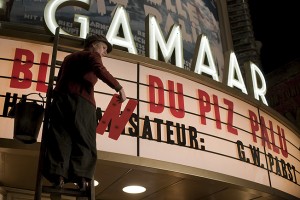
Shoshanna’s marquee indicates the cinema is showing Riefenstahl mountain movie “The White Hell of Piz Palu” (1929)
Second, Christoph Waltz gives a true gem of a performance as Hans Landa. Tarantino has remarked that he thought the mercurial role potentially unplayable, and that Waltz “gave me my movie.” Waltz as Landa is at turns calculating, scary, and, sometimes, downright wacky (upon capturing Raine and Utivich, he exclaims, “That’s a bingo!” in a cartoonish voice). He perfectly conveys the sense that Landa is (almost) always one step ahead of all the other characters, and can see straight through anyone attempting to perpetrate a ruse. Waltz absolutely deserved the Oscar he won for Best Supporting Actor.
Oh, fine, third (but it ties into the last point): The film incorporates a variety of spoken languages to really create an authentic film world. French, English, German (with and without an awkward English accent), and Italian all crop up throughout the film, and Landa speaks them all perfectly, adding to his sense of both mystique and menace.
In closing, if you’re looking for a well-crafted movie that throws in a lesson in languages and early film history along with the explosions and buckets of blood, look no further than Inglourious Basterds, the film which might just be Tarantino’s masterpiece.
Tidbits: Tarantino has been vague as to why he went with the odd spelling of the title. I would posit it’s because that’s how he actually spells. Tarantino habitually hand-writes his scripts, which must then be parsed and typed up by members of his family. I don’t have particularly good handwriting, but it’s better than Quentin Tarantino’s.
-Bridget Von Hammersmark is played by Diane Kruger, who also played Dr. Abigail Chase in previous Countdown entry National Treasure. In that film, a brief reference is made to her having a German accent, even though she doesn’t really. I was confused by this until I learned that Kruger really is German, and speaks the language flawlessly in Basterds. Harvey Keitel, another National Treasure alum, also appears here, as the voice of Raine’s superior officer.
-If you enjoy Inglourious Basterds, definitely check out 1967’s The Dirty Dozen. It’s a remarkably similar film, released more than 40 years before Basterds – a group of soldiers known for brutal tactics are assembled to form a secret task force, and charged with going behind enemy lines to attack a number of high-ranking Nazi officials gathered at a posh party. The film ends with many of the “Dozen” killed and the trapped Nazis burning alive.
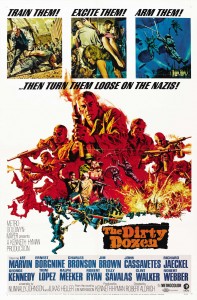
Tarantino may have some ‘splainin to do.
—
Brian Terrill is the host of television show Count Gauntly’s Horrors from the Public Domain. You can keep up with Brian’s 100 Film Favorites countdown here.




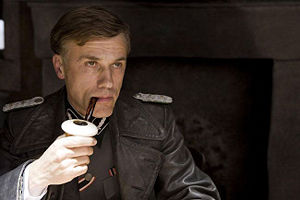

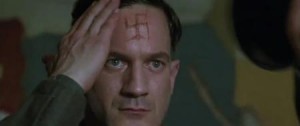
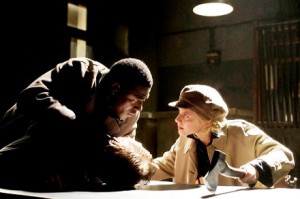
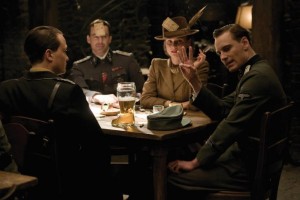
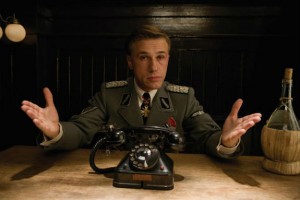
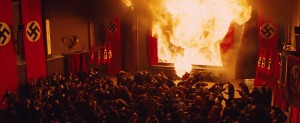
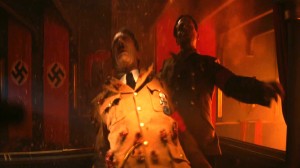
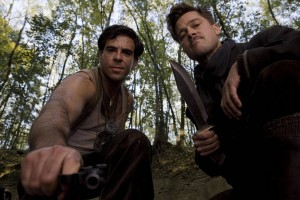
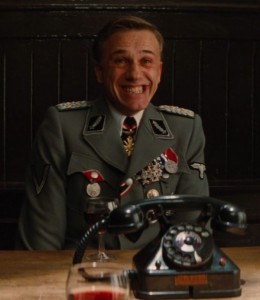
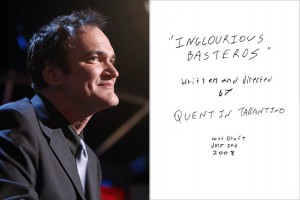



#18… I take it you like this movie more than Grant